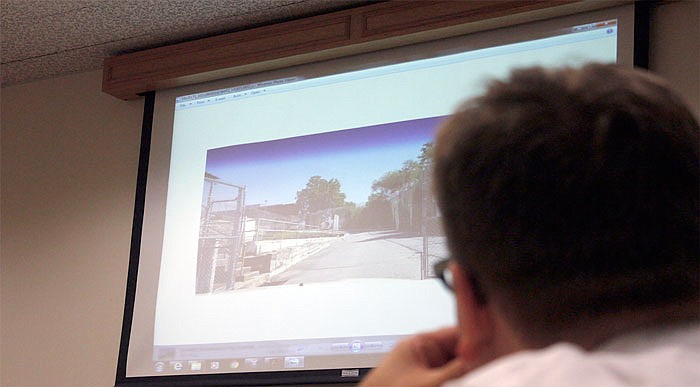The city bus bumped along the road, the former Missouri State Penitentiary passing by the windows.
Councilman Mark Schreiber stood at the front, his voice echoing through the microphone as he described the history of the prison. Jefferson City Council members and city staff peered out the windows, looking at the property the city hopes to gain.
During Monday night's City Council work session, the council and city staff toured MSP and specifically looked at the area they hope to get from the state if Gov. Eric Greitens signs off on SB 486, granting the city government 31.82 acres of of the old prison grounds. The area extends east to west from Chestnut Street to the historic area of the penitentiary and north to south from the Missouri River to Capitol Avenue.
"It was great to be on-site , and it really gives you the vision of what it is now and what it's going to be in the future," Jefferson City Mayor Carrie Tergin said. "This development is really the first of its kind, because we're actually being able to develop this old, historic site into something that would be of value to the state."
The legislation - sponsored by state Rep. Mike Bernskoetter, R-Jefferson City - was passed unanimously in late March by the Senate and in early May by the House with a 127-17 vote.
The site is 140 acres with 128 being undeveloped. The city would develop 32 acres, while the state would control 95 acres to the east for future development
Of the 31.82 acres, about 6.2 acres contains the railroad and 1.5 acres is for the Lafayette Street right of way. About 4.4 acres will be for the MSP Parkway right of way, leaving 19.7 acres for the city to develop.
The parkway is supposed to go from the circle end of Lafayette Street, extend east and south through the property, and connect with East Capitol Avenue. There would also be a roundabout east of Chestnut Street.
Tergin said the county and city would partner to build the parkway. The entities would use the joint city-county sales tax funds to help fund the building of the parkway. The cost of the parkway is unknown.
Redeveloping the area is not a new idea, though. A redevelopment commission was created in 2001, and it helped create the master plan. Even though it's been several years since the creation of that plan, Schreiber said it's still applicable. Tergin said the council would use the master plan as a guide for redeveloping the land if Greitens signs the legislation.
Tergin said if the city does receive the land, developers will help decide what features to add to the redevelopment. Hotels, entertainment venues, dining areas, retail stores and offices are some of the proposed uses for the redevelopment. Tergin said these uses would help with tourism at MSP.
MSP operated as a prison for about 168 years, from 1836 to when the prisoners were moved to the new Jefferson City Correctional Center in 2004.
The state currently leases the prison to the Jefferson City Convention and Visitors Bureau for prison tours. Since the tours started in 2009, the number of visitors has increased from about 3,000 the first year to 33,000 last year.
The main prison buildings used for the tours would remain in the state's possession if the city were given the 32 acres. The gas chamber would be in the city's possession, but Tergin said the chamber would not be touched and would still be available for tours.
Tergin said the redevelopment has "so much potential" because of the tourism and because Jefferson City is the only city in the country to have a major river, capitol and state penitentiary in one place.
"The state has had it now and it's been vacant for 13 years, and they came out with a master plan, but they just never took the next step to put it in action," she said. "We as a city are saying, 'This land and the prison site is in the heart of our city, so we would just like to help facilitate some development.'"
Former Jefferson City Mayor John Landwehr, who was involved with the original master plan, attended the work session. After discussing the purpose of the master plan, he advised the City Council to "be patient go slow and get good advice" while proceeding with the project.
"This is not just a feel-good project. This is a large value of acres in the central core of your city," Landwehr said. "We have to be very careful with that, and we have to be guardians of that and make sure it doesn't remain this dilapidated area if we don't do something. It's bigger and (more) complicated than anything a city council has ever encountered in terms of scope and complexity."

